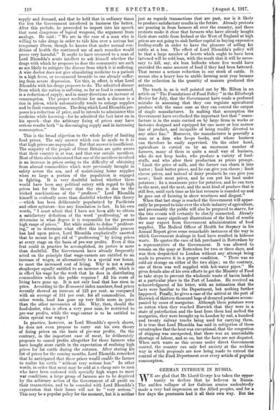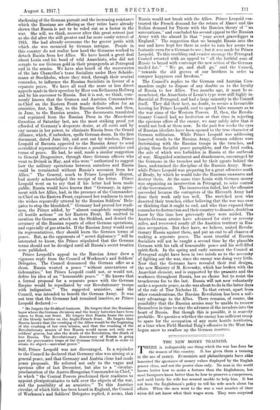GERMAN INTRIGUE IN RUSSIA.
WE are glad that Mr. Lloyd George his taken the oppor- tunity to declare that he believes in Russia. The sudden collapse of her Oalician armies undoubtedly made a very bad impression on the Allied peoples, and for a few days the pessimists had it all their own way. But the slackening of the German pursuit and the increasing resistance Which the Russians are offering as they retire have already shown that Russia is not to be ruled out as a factor in the war. She will, we think, recover'after this great retreat just as she did after the still greater and far more costly retreat of 1915. She had already overcome the far graver perils with which she was menaced by German intrigue. People in this country do not realize how hard the Germans worked to detach Russia from her Allies. We have heard a great deal about Lenin and his band of wild Anarchists, who did not scruple to use German gold in their propaganda at Petrograd and in the armies. We have also heard of the manceuvres of the late Chancellor's tame Socialists under Herr Scheide- mann at Stockholm, where they. tried, through their neutral comrades, to influence the Russian Socialists in favour of a separate peace. We have all read the more or less direct appeals made in their speeches by Herr von Bethmann Hollweg and by his successor to Russia. But it is not, we think, com- monly known that the German and Austrian Commanders- in-Chief on the Eastern Front made definite offers for an armistice, first, in May, to the Russian Generals, and then, in June, to the Russian armies. The documents, translated and reprinted from the Russian Press in the Manchester Guardian of Saturday last, are the most striking proof yet afforded of Germany's desperate desire, at all costs and by any means in her power, to eliminate Russia from the Grand Alliance, which, if unbroken, spells German doom. In the first document, dated June 5th, and sent out by wireless, Prince Leopold of Bavaria appealed to the Russian Army to send accredited representatives to discuss a possible armistice and terms of peace. He had, he said, made a similar suggestion to General Dragomirov, through three German officers who went to Dvinsk in May, and who were "authorized to suggest how the military operations between ourselves and Russia could be terminated without Russia's secession from her Allies." The General, much to Prince Leopold's disgust, had merely acknowledged the receipt of the letter. Prince Leopold went on to say that if his letter had been made public, Russia would have known that "Germany, in agree- ment with her Allies, had, in the presence of the Commander- in-Chief on the Eastern Front, expressed her readiness to meet the wishes repeatedly uttered by the Russian Soldiers' Dele- gates to stop the bloodshed." Germany had proved her readi- ness, the Prince added, by "almost completely suspending all hostile actions" on her Eastern Front. He omitted to mention the German attack on the Stokhod, and denied the accuracy of the Russian reports of other German operations, and especially of gas attacks. If the Russian Army would send its representatives, they should learn the German terms of peace. But, as the opponents of "secret diplomacy" will be interested to know, the Prince stipulated that the German terms should not be divulged until all Russia's secret treaties were published.
Prince Leopold's appeal to the Russian Army drew a vigorous reply from the Council of Workmen's and Soldiers' Delegates. The Council denounced the German offer as a sham. Russia wanted a peace "without annexations or indemnities," but Prince Leopold could not, or would not, define his idea of an "honourable peace." "He knows that a formal proposal for a separate peace with the German Empire would be repudiated by our Revolutionary troops with indignation." The suggested armistice, said the Council, was intended to benefit the German Army. It was not true that the Germans had remained inactive, as Prince Leopold declared :- "He forgets the Stolchod business. He forgets that the Russians 'mow where the German divisions and the heavy batteries have been taken to from our front. He forgets that Russia hears the noses of the bloody battles on the Anglo-French front. He forgets that Russia knows that the crushing of the Allies would be the beginning of the crushing of her own armies, and that the crushing of the Revolutionary armies of free Russia would mean not only new soldiers' graves, but also the death of the Revolution, the death of free Russia. The Revolutionary democracy of Russia is going past the provocative traps of the German General Staff in order to attain its object—universal peace."
Still, Prince Leopold was not discouraged. In a rejoinder to the Council he declared that Germany also was aiming at a general peace, and that Germany and Austria alone had made peace proposals. He referred not only to the vague and specious offer of lest December, but also to a "circular- proclamation of the Austro-Hungarian Commander-in-Chief," in which "the Central Powers proclaimed their readiness to appoint plenipotentiaries to talk over the objects of the war, and the possibility of an armistice." To this Austrian circular, of which little has been heard in England, the Council of Workmen's and Soldiers' Delegates replied, it seems, that Russia would not break with the Allies. Prince Leopold con- trasted the French demand for the return of Alsace and the Italian demand for Trieste with the Russian theory of "no annexations," and concluded his second appeal to the Russian Army with the absurd lie that "your secret gravedigger is England." The suggestion that we brought Russia into the war and have kept her there in order to ruin her seems too fantastic even for a German to use ; but it was made by Prince Leopold. To this rambling and evasive message the Petrograd Council retorted with an appeal to "all the faithful sons of Russia to brand with contempt the new action of the German mailed fist." "We go, and shall go," said the Council. "towards the old graves of our brothers in order to conquer happiness and freedom."
The Council's replies to the German and Austrian Com- manders ought to dispose of any doubts as to the loyalty of Russia to her Allies. Two months ago, it must be re- membered, the Anarchists of Lenin's type were still highly in- fluential at Petrograd, and had a large minority in the Council itself. They did their best, no doubt, to secure a favourable hearing for Prince Leopold, and to spread false rumours as to the war aims of the Western Powers. If, then, the Revolu- tionary Council had no hesitation at that time in rejecting the specious offers IA the enemy, we may safely infer that it would not look at them now. In the past few weeks the eyes of Russian idealists have been opened to the true character of German militarism. While Prince Leopold was addressing honeyed words to the Russian Army, German soldiers were fraternizing with the Russian troops in the trenches, and giving them Socialist peace pamphlets, and the fatal vodka. the sale of which was forbidden in Russia at the outbreak of war. Misguided sentiment and drunkenness, encouraged by the Germans in the trenches and by their agents behind the lines, undermined the discipline of the Russian Army. Mean- while Prince Leopold was preparing for a great offensive south of Brody, by which he would take the Russians unawares and destroy them. At the same time Lenin with German money was organizing an insurrection in Petrograd, to seize control of the Government. The insurrection failed, but the offensive succeeded because the corrupters of the Eleventh Army had done their work only too well. The wretched men who deserted their trenches, either believing that the war was over or thinking that it ought to end, and who thus exposed their comrades to destruction and their country to disaster, doubtless know by this time how grievously they were misled. The Austro-German armies have advanced for sixty or seventy miles, and recovered nearly all the Austrian territory in Rus- sian occupation. But they have, we believe, united Revolu- tionary Russia against them, and put an end to all chances of making a separate peace. The most trustful of Russian Socialists will not be caught a second time by the plausible German with his talk of honourable peace and his well-filled spirit-flask. In the spring and early summer the Council at Petrograd might have been in two minds as to the necessity of fighting out the war, since the enemy was doing very little. Now that the Germans have revealed their real designs, the new Ministry of M. Kerensky, which has broken with the Anarchist element, and is supported by the peasants and the workmen throughout Russia, has no choice but to resist the treacherous foe to the last. Russia will not now voluntarily make s separate peace, as she was about to do in the latter days of the rule of Tsar Nicholas II. To that extent, apart from other considerations, the Russian Revolution has been a mili- tary advantage to the Allies. There remains, of course, the possibility that the Russian armies may be unable to recover themselves in time to stay the advance of the invaders into the heart of Russia. But though this is possible, it is scarcely probable. We question whether the enemy has sufficient troop to spare for the occupation of any more hostile territories. at a time when Field-Marshal Haig's offensive in the West has begun anew to swallow up the German reserves.



























 Previous page
Previous page